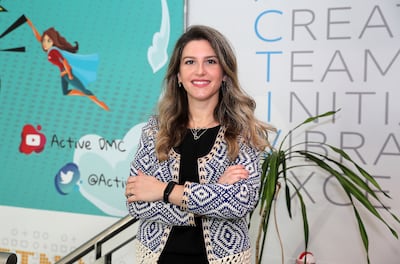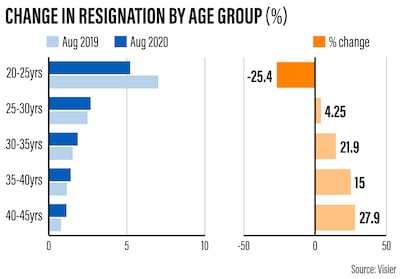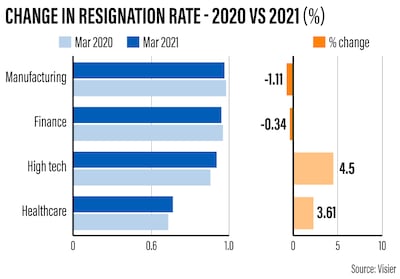Nauf Mawla, a communications consultant in Dubai, is grateful for the three-day weekend her job currently offers as it gives her more time to do the things she enjoys.
She is an employee at Active Digital Marketing Communications, a Dubai agency that is currently trialling a four-day work week until the end of the year.
“The four-day work week plays a huge role in reducing stress,” Ms Mawla says. “It allows us to manage the other part of our life – our personal life away from work, making us feel accomplished while reducing outside stressors and, therefore, increasing productivity during the week.”
“Looking back, I realise I was always running around during the weekend, trying to find a schedule that best fits my personal needs. From meeting friends and family, to getting things done around the house, barely getting in some quality time for myself, all the while mentally gearing up for the week ahead.”

Employers globally are increasingly adapting traditional work models to allow employees to juggle work and home life, while having more time for personal pursuits. Prolonged work-from-home arrangements during the Covid-19 pandemic have convinced employers about the need for hybrid work models, while more employees are demanding an improved home-life balance as they return to the office full-time.
The widening disconnect between employers and employees about a possible return to the office after Covid-19 could lead to a wave of resignations and increase worker disengagement, according to a report by global consultancy McKinsey.
Globally, employees are leaving their jobs at much higher rates than normal. About 42 per cent of remote workers said if their company does not continue to offer options to work from home in the long term, they will look for a job that does, according to a March 2021 survey by financial services company Prudential.
The pandemic encouraged many organisations, including crowdfunding company Kickstarter and consumer goods operator Unilever, to try the four-day week. The move comes after a public sector trial in Iceland to introduce a four-day week that resulted in many people going from working 40 hours a week to 35 or 36 hours.
“The new work week has allowed me a full additional day to focus on myself and what I want to achieve that week, whether personally or professionally,” Ms Mawla says.
“Whether it’s picking up a new hobby, enjoying an existing one, or simply taking the day off to rest in the lead up to a busy week. That extra day allows us to go into work on Monday feeling productive, ready to hit the ground running with our priorities set, and a sense of predictability for what the week looks like”
Employees in the digital marketing communication agency currently work from 8.30am to 6.30pm from Monday to Thursday.
communications consultant, Dubai
Workers’ personal lives directly affect their professional lives and vice versa, Ms Mawla believes. If they do not feel motivated, accomplished and challenged personally, they will not feel that way at work, she says.
“Now, I find myself switching off from work a little more than I was able to before.”
The owners of Active Digital Marketing Communications started discussing the feasibility of a four-day week in April. They initially researched and analysed the experiences of contacts in the UK who had already tried shorter working hours or working weeks. They then studied the legal and practical implications of such a decision in the UAE.
“Living and working through a pandemic and all the challenges it threw at us, we realised early on that we needed to adapt and embrace change fast,” says Sawsan Ghanem, managing director of Active Digital Marketing Communications.
“From the outset, the heart of this move was all about the people, the team at the agency. We know that in the marketing, advertising and public relations field, people are what make an agency and they are our priority. We also wanted to offer new talent a compelling work environment to be a part of and thrive in.”

The decision to adopt a four-day week was also driven by the need to promote enhanced productivity and offer employees a better work-life balance so “they would become more energised, creative and passionate about what they do for clients every day”.
“We’ve been at the forefront of the new ways of the working narrative. We adapted fast to working from home as soon as Covid-19 struck as at the end of the day, business had to carry on, we had clients to service, employees to look after and bills to pay,” Ms Ghanem says.
Even though the agency has moved to a four-day week, their communications professionals regularly check, read, respond to emails and monitor news and content on social media channels.
“We will not be signing off and disappearing regardless,” Ms Ghanem says. “At the end of the day, we recognise that being agile and dynamic allow us to also learn and respond to any unforeseen challenges that may arise from taking this pioneering step in the region.”
managing director, Active Digital Marketing Communications.
Big Tech companies such as Google and Microsoft have also offered hybrid work options to their employees, while Twitter has already allowed its staff to work from home permanently. Facebook has pushed back its office return date for all US and some international employees until January due to concerns over the highly infectious Delta variant.
Apple pushed back its return to the office deadline to October at the earliest, responding to a resurgence of Covid-19 variants across many countries. The iPhone maker said it will give its employees at least a month’s warning before mandating a return to offices.
Amazon has also postponed the date for corporate workers to return to the office until early next year. The company, based in Seattle, had previously said its employees should come back by September 7, but has pushed that date back to January 3.
While some employers are adapting their working models, other companies are moving to purpose-built premises that create an inspiring environment for staff. Dubai law firm Al Tamimi & Company recently moved into a new office at Central Park Towers in DIFC, where the space is designed to create a new way of working and an inspiring environment that can achieve efficiency and work-life balance.
The company, which introduced the hybrid operating model in its offices across the region, originally planned to secure up to 100,000 square feet of space. However, the implementation of the hybrid work model meant that it ended up taking only 60,000 sq ft.
“Fundamentally, the pandemic accelerated a future of work conversation that was always on the radar of most businesses,” says Samer Qudah, managing partner of Al Tamimi & Co. “What has become clear is that we can work from anywhere and still collaborate effectively with colleagues. We drew on the positives of this experience and asked our colleagues their preferred ways of working. Their feedback was vital in us implementing a new hybrid-working model.”
The law firm credits the new office as the main enabler of its hybrid working model in terms of its design, layout and technology.
The new office accommodates a working culture that enables colleagues to work from the office, home or anywhere in the world, Mr Qudah says.
“Businesses are using a hub, home, roam approach to how they are getting back to work. The office is increasingly being used as a hub where you come together, collaborate and interact with colleagues, and more staff are working from home or while on the move [roam],” Mr Qudah adds.
“The office is our hub and it was designed with one key principal at its core – collaboration. It has a complete flexi-desk approach where colleagues book their desks and rooms using an app.”
There is a large collaboration area in the middle of the two floors where the law firm has set up a digital communications screen and breakout pods. This area creates an inspiring environment for staff and a more dynamic way of working, Mr Qudah says.
“We realise that being sat at a desk for hours can result in fatigue and can become an uninspiring environment. To ensure our colleagues have the right balance, we have created spaces across the office that they can break away to.”
This can be to collaborate with other colleagues, take a break or work in a different environment. The office also has no designated desks, meaning anyone can sit anywhere.

“Having complete flexibility and not being confined to the same desk or space is a fundamental feature of our operating model along with the capability to work from anywhere,” Mr Qudah says.
The law firm can accommodate all its employees at any one time but this would require it to use the open spaces. The company can accommodate around 180 people in the enclosed rooms in the new office and a further 120 in the various open spaces.
Meanwhile, more people across industries globally are quitting their jobs and pursuing dream careers as part of the “Great Resignation” trend that was triggered by work stress and uncertainty during the pandemic.

Nerry Toledo, a Filipino resident in the UAE, left her job as a consultant in a public relations agency in Dubai last year to pursue her passion. She now teaches yoga and takes on freelance writing and PR projects to supplement her income.
“The pandemic was an opportunity. It disrupted our habitual routine. It pushed us out of our comfort zone and led us to ask questions about what matters and what is worth doing. It helped me to rediscover my strength,” Ms Toledo says.
Even though her income varies from month to month, Ms Toledo says she derives happiness from knowing what she is doing has a lasting impact and because she chooses not to settle for a mundane existence.
“Until now, everyone was worried about the financial impact of choosing your own path. But if you follow your heart and create a social impact, the money will follow,” she says. “Also, if you think of financial uncertainty, know that your 9-to-5 job could not last for ever, too.”
This flexible working model makes her happier and she feels more alive. There is no turning back to the traditional 9-to-5 work routine now, she says.
“I am doing what I love and it fires me up. I am excited to wake up every morning and be creative,” Ms Toledo adds. “If you don’t take the plunge, you will never know your true potential.”
However, she says if you need to be your own boss, you must have proper discipline and set tangible goals. Citing no disadvantages for this working model, Ms Toledo says when people experience setbacks, they tend to learn from them.
freelance yoga instructor
There was a surge in demand for mental health support among employees globally during the pandemic. Cases of depression, anxiety and other mental health issues increased after the onset of the coronavirus outbreak, as many workers struggled to come to terms with changes to their daily lives including travel restrictions, remote working and physical distancing rules.
Now that Covid-19 restrictions are easing, people have become more conscious of the importance of their mental health, according to Soniyaa Punjabi, founder of well-being platform Illuminations.
“During the pandemic, most businesses faced a massive setback, while employees had to work harder and longer than before, and all of this, combined with the ongoing chaos, took a toll on society at large,” she says.
“More and more of our working clients have observed a positive shift in their attitude when they started to focus on prioritising their happiness over their hustle and came out to seek support and get counselled.”
Stress among the UAE workforce, although lower than the pre-pandemic period, ranked among the highest in the world at 88 per cent, according to health insurance company Cigna. About 34 per cent of workers in the UAE cited lack of support by employers and 39 per cent want employers to provide resilience training to improve mental health, Cigna’s survey findings revealed.
More organisations are now waking up to the fact that their employees’ well-being is proportionate to the growth of their business, according to Ms Punjabi.
Every business should incorporate a mental health strategy to ensure their employees’ well-being and a good work-life balance, she says.
“The strategy could include intrinsic incentives such as expressing their concerns clearly, sticking to office timings and ensuring clear communication in terms of deliverables. Also, introduce wellness sessions, where corporates can organise informative talks, activities and retreats to engage and uplift their employee’s morale,” she points out.
founder, Illuminations
Companies should look at creating an environment for transparent and honest communication and offer a safe space for employees to vent, Ms Punjabi says.
Employers can also have a mental health policy in place, which can include important helpline numbers where anyone can receive a free consultation. Leaders must exercise empathy for distressed professionals, host video calls to help with employee morale and organise de-stress sessions or short meditative activities, which create a conducive environment for employees to feel relieved, assured and trusted, she says.
Meanwhile, the pandemic has also upended traditional working models, with recruiters saying that prospective employees are more demanding and seeking over and above traditional incentives usually offered by employers.
“During the past two decades, we saw some forward-thinking businesses offer more than the compulsory UAE standard benefits to attract and retain top talent,” says Nevin Lewis, chief executive of Black & Grey HR.
“The multinationals, large local groups and cool tech start-ups started creating amazing workspaces, offering free lunches and organising regular events celebrating the diversity of people working in the company to engage and retain top employees. Lately, more employees want to work from anywhere and these selling points are no longer as attractive as they used to be.”
Potential job candidates at some of the UAE’s top employers are looking at company stability, competitive compensation and benefits. This comes in addition to flexibility at work, continuous training and development programmes, premium medical and life insurance, a humanised and transparent virtual hiring process and recruitment experience, Mr Lewis says.
Candidates are increasingly asking employers about work from home or a hybrid work models. However, many services and manufacturing industry jobs need their employees on site to perform their responsibilities. They do not have the luxury to work from home, he emphasises.
“A lot of tech professionals we hired in the past year have never stepped foot into their new employer’s office and have only seen their manager and colleagues through a monitor,” Mr Lewis says. “I see this as an opportunity for some businesses to hire top talent from global talent pools based on their business needs and not based on candidates’ proximity to the business headquarters.”
Remote recruiting is here to stay, so optimising the candidate experience is becoming key to attracting, engaging and hiring top talent, he says, adding that HR leaders must introduce online skill development programmes to reskill their existing employees and build the workforce of the future.
chief executive, Black & Grey HR
Rigid or inflexible employers are seeing a higher rate of attrition, Mr Lewis says. The single biggest contributing factor to high attrition rates is low employee satisfaction usually caused by rigid or inflexible employers, he explains.
“Employers need to be more flexible in scheduling and regularly encourage their employees to take time off. We also need to re-evaluate perks and benefits and include virtual employee assistance programmes from licensed psychologists to warrant employees’ mental health.”
Business leaders also need to encourage transparent communication and talk to their employees consistently and thoughtfully, Mr Lewis says.







